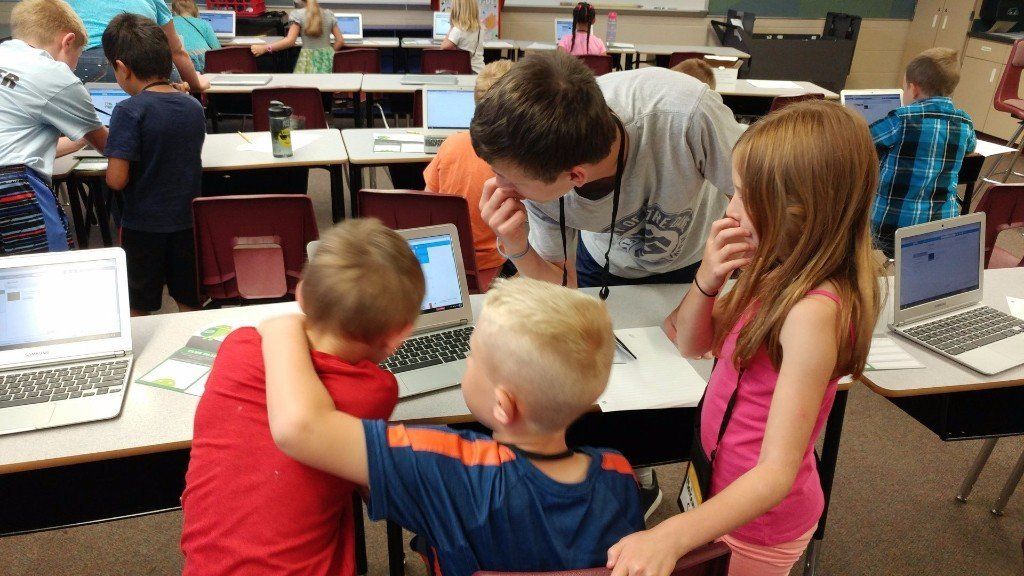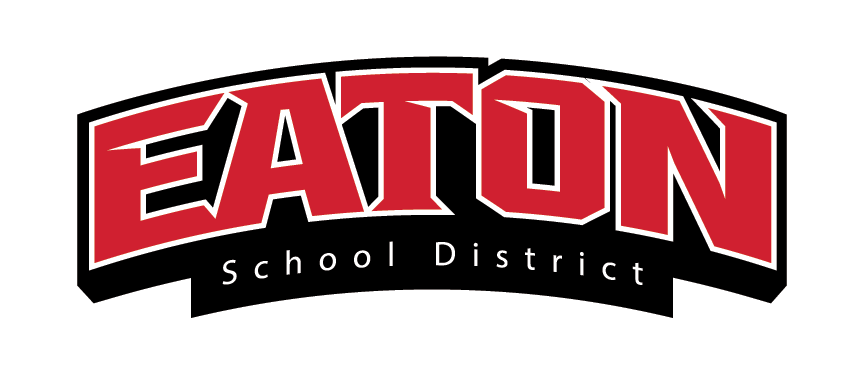Click on the Literacy Curriculum Transparency icon to find information on our core and supplemental reading curriculum, core and supplemental reading instructional programs and additional information about our READ Act program in accordance with Senate Bill 21-151.
Eaton School District
Main: (970) 454-3402 | Fax: (970) 454-5193 | 211 1st Street, Eaton, CO 80615
District Curriculum & Assessment

Student engagement, high expectations, and academic rigor build the foundation of the educational environment at Eaton School District. Our Board of Education supports small class sizes and free all-day kindergarten. Teachers and students are provided the tools they need to learn. Students in grades 3 and above have 1 to 1 access to computers and K-2 students enjoy 2 to 1 access. At Eaton, we embrace the culture of doing, making, and thinking that built the community we live in today. You will find 3D printers, robotics, laser engravers, and much more in our schools.
The creative arts are an important part of our curriculum with outstanding art, choirs, bands, and theatre performances.
Eligible students at EHS are able to obtain college credit for courses taken on campus, off campus, and online in English, Math, Science, History, Spanish, Accounting, Agriculture, and Early Childhood Education. Eaton students enjoy access to robust electives that will help them explore career options within agricultural, STEM, Arts/Design, Journalism/Publishing, Performing Arts, Computer Programming, Skilled Trades, Health Sciences, Human Services, Business.
Curriculum & Standards
The dedicated staff members of Eaton Re-2 are continually working to improve instruction to better meet the needs of our students and community. We maintain a six year curriculum review cycle that allows us to focus our time, professional development, and curriculum budget on a few curriculum areas at a time. The Eaton Curriculum and Assessment Council (ECAC) meets quarterly to review the curriculum development process, assessment program, and our professional development plan.
Eaton Schools RE-2 has adopted the Colorado State Standards. The new national standards commonly know as the Common Core Standards, are integrated within the Colorado Standards. The National PTA has a great resource called the Readiness Roadmap that helps parents understand what is expected at each grade level. (You can find more information on the Readiness Roadmap website through this following link: https://bealearninghero.org/readiness-roadmap/). It is important to understand that standards are common expectations for performance, not curriculum. Eaton RE-2 decides what books to read and what we should write about. Unique to Colorado are the Financial Literacy standards. Students will learn about financial literacy in every grade level integrated within their social studies and math curriculum.
Each school provides services and programming to students based on their individual needs. To better serve our families we have adopted a multi-tiered system of supports (MTSS). In Colorado, a Multi-Tiered System of Supports (MTSS) is defined as a prevention-based framework of team-driven data-based problem solving for improving the outcomes of every student through family, school, and
community partnering and a layered continuum of evidence-based practices applied at the classroom, school, district, region, and state level. Read more about the layers of support we provide in our MTSS Handbook. (You can find more information on the MTSS Handbook through this following link: https://docs.google.com/document/d/17A5in4TYNGaTrJ0HZkLDuHZkrKdDGWn3UDg1jziiPkI/edit#heading=h.f2l3ti2muknr).
Students with identified Special Education Needs receive services in cooperation with
Centennial BOCES. (You can find more information about CBOCES on their website with the following link:
https://www.cboces.org/). English Language Learners are identified and monitored on their progress in learning to read, write, listen and speak in English. Our Gifted Education program meets the individual needs of each student through a variety of programs and services in each building. Each school has a student intervention team that exists to identify and monitor student needs in their academic, social, and emotional growth.
Early Childhood Education and Services are available through the Colorado Preschool Program at the Eaton Early Learning Center.
Assessment
Eaton RE-2 uses a variety of assessments to measure progress toward the standards and guide daily instruction. In addition to classroom assessments, there are district assessments for math, reading, writing, and science. Additional information is gained through administering STAR assessments in literacy and math K-12 from Renaissance Learning. Teachers can use the data from STAR assessments to develop customized learning guides based on what each individual or an entire class needs to know. Students in Eaton School District continue to score well both regionally and compared to the state. Detailed accountability information for all Colorado Districts and Schools is available through the following link: www.schoolview.org.
The state also has annual assessments for grades 3-11 in math, reading, and writing. Students in 3rd through 8th grade will take a CMAS (Colorado Measures of Academic Success). Colorado is no longer part of the PARCC test consortium. PARCC will be replaced with a shorter online assessment that will look similar to PARCC in its question types and content. At the high school students take the PSAT 9, PSAT 10 and the SAT to measure how well prepared they are for college entrance in math, reading, and writing. The state also has students in grades 5, 8 and 11 take an annual CMAS Science test. Social Studies is measured in grades 4, 7, and 11 every other year. State testing usually takes place in the month of April.
The district maintains an assessment calendar with information on the dates, length, and frequency of each assessment given. To find more information on the assessment calendar, you can use this following link: https://docs.google.com/spreadsheets/d/1igs-oL547KuYsolRRfcwd_L1j9RPE3KkBuFs8Y-UK4E/edit?usp=sharing.
Parents who are considering opting their students out of state assessments may fill out this online form for each student they wish to opt out of testing. The building principal will contact you after you have submitted to confirm participation. To find the
CMAS OPT Out Form, you can click this following link:https://docs.google.com/forms/d/e/1FAIpQLSe08hdhTsFxRlFgX_tGPGUeb_aKoHfz3S4rhQggpS-Z7sFU4Q/viewform.
C.R.S. section 22-7-1013(8) requires each local education provider to adopt and implement a written policy by which a student's parent may excuse the student from participating in one or more of the state assessments without imposing negative consequences on the student or parent. Additionally, the local education provider must have a procedure to track parent refusals and may not do anything that would discourage a student from taking a state assessment or encourage the student’s parent to excuse the student from taking the state assessment. State assessments that are included in this policy are CMAS and CoAlt English Language Arts, Mathematics, Science, Social Studies, the new tenth-grade preparatory exam, and the eleventh-grade college entrance exam. The English language proficiency exam (ACCESS for ELLs) is not included in this policy. Also not included are READ Act assessments (Dibels Next & Star Early Learning). Please be aware that currently, state and federal requirements around testing and parent refusals are not fully aligned. The federal 95 percent participation requirements are still part of federal law.
Literacy Curriculum Transparency
Gifted Education
What is Gifted Education?
Gifted and talented students should be provided opportunities to perform and learn at the highest level possible. Effective educational practices provide a supportive learning environment in the classroom. Diverse programming and enrichment opportunities are available to meet the needs of these students. Gifted students are those persons whose abilities, talents, and potential for accomplishment are so outstanding that they require special provisions to meet their educational needs. Talented students typically demonstrate some characteristics of being gifted and high performance levels. We strive to meet the needs of both gifted and talented students. Not being identified as gifted will never limit a child’s opportunities in Eaton schools.
What are effective educational practices for Gifted & Talented students?
There are many ways the school staff may provide challenge within the regular classroom/curriculum by means of differentiation, content acceleration, and cluster grouping. We can differentiate what they learn, the way we learn, or the final product. Activities can be differentiated based on readiness level, interest, and learning style. These principles apply to all students. Gifted and talented students typically need differences in the thinking level of the assignment, choices in the work procedures and real-world product expectations. Content acceleration allows gifted and talented students to learn at their own pace. This is accomplished either within a balanced classroom through advanced reading assignments, individual math work, and independent study or through honors/advanced class placement. Cluster grouping provides opportunities for gifted students to work with other gifted peers as a “cluster” within a larger, balanced ability class and is a highly effective strategy.
For more information please contact Marcy Sanger at msanger@eaton.k12.co.us or 970-454-3402 x613
To access our handbook, you can use the following link: https://docs.google.com/document/d/18qLqY3EvLtUOZx2ie8r5Fpjpbf9jthTygSwd7dsNGVI/edit#heading=h.newjcyz97o27
HAGA CLIC AQUÍ PARA MÁS G & T INFORMACIÓN Y RECURSOS EN ESPAÑOL
Identification Process
A detailed explanation of the identification process is
available in the handbook . All students will be screened for the gifted education program in 2nd grade. After second grade students will be reviewed through the referral process detailed below.
Parents, teachers and community members may request that a student be evaluated by their school for potential identification for Gifted Education. Students that are referred should be demonstrating exceptional strengths or talents well above grade/age level performance of their peers. The school team will review the referral and all available evidence of exceptional performance and determine if further review is needed or if more evidence needs to be collected in order to qualify a student as gifted. Please see the Gifted Education handbook available on the district website for detailed information on identification.
To access the referral form in English, you can use the following link: https://docs.google.com/forms/d/e/1FAIpQLSeiA8zK1w-zu8zB6mnDtE-eVnMKhg7cKvJAxMz3p_xAeKMn6A/viewform
Por favor, use este formulario para solicitar que un estudiante sea evaluado por su escuela para el potencial de identificación para Dotados Educación. Los estudiantes que se hace referencia deben demostrar fortalezas o talentos excepcionales muy por encima de rendimiento de nivel de grado / edad de sus compañeros. El equipo de la escuela revisará la referencia y todas las pruebas disponibles de un rendimiento excepcional y determinar si es necesario un nuevo examen o si hay más pruebas necesita ser recogidos con el fin de calificar a un estudiante como dotados. Por favor consulte el manual de Educación para Dotados disponible en el sitio web del distrito para obtener información detallada sobre la identificación.


